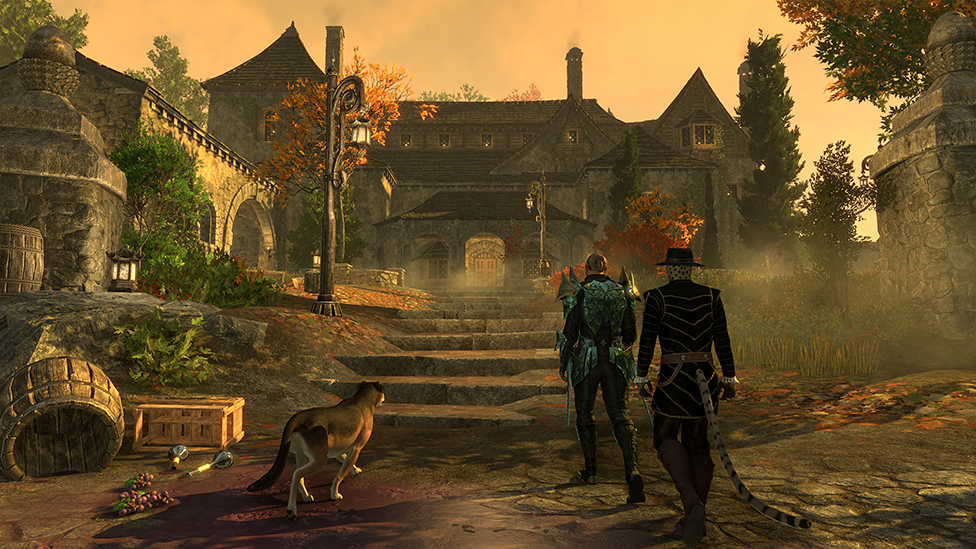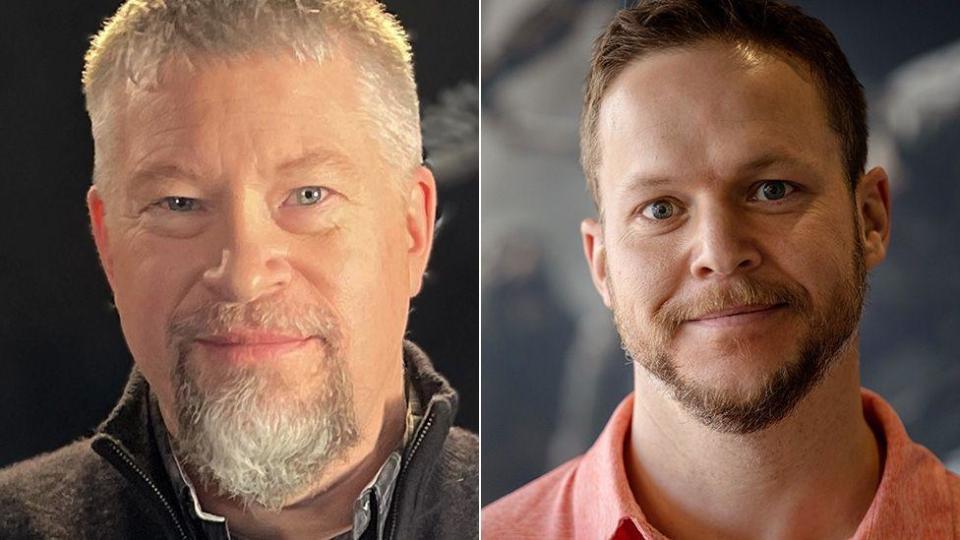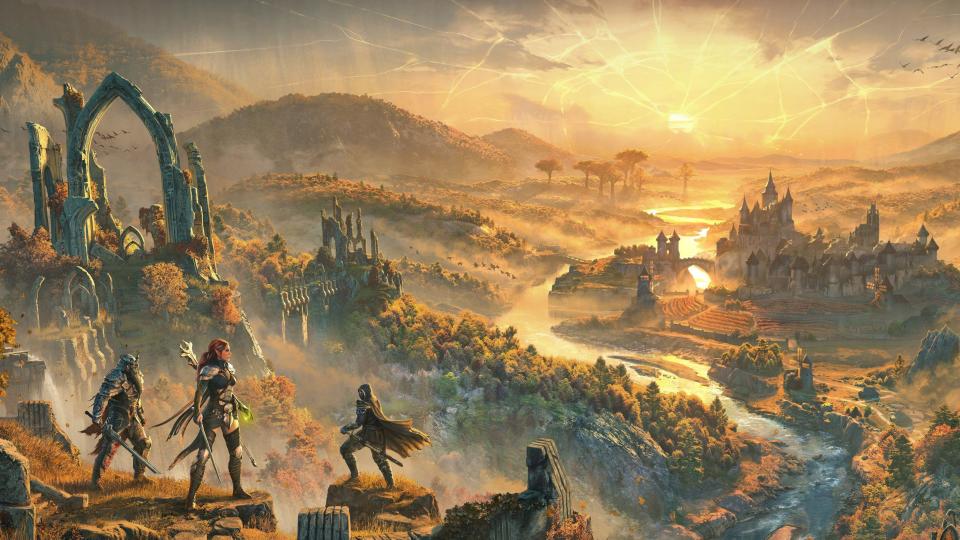Building a $2bn online game by breaking the rules

Ask anyone to name a successful online multiplayer game and you're likely to get a handful of names in response.
Fortnite, Call of Duty, League of Legends, Roblox, Helldivers II.
But there's another title, celebrating its 10th anniversary this year, that's been a relatively quiet success.
The Elder Scrolls Online (ESO), a spin-off of the hugely popular fantasy RPG series from Fallout makers Bethesda, has been played by 24 million people and made $2bn since it launched.
Developer Zenimax Online Studios began work on the game in 2007 following the huge success of single-player game The Elder Scrolls: Oblivion two years earlier.
At the time, massively multiplayer online role-playing games, or MMORPGs, were all the rage, with World of Warcraft, Everquest and Dark Age of Camelot attracting millions of players.
So an Elder Scrolls take on the genre seemed, on paper, like a sure-fire hit to many.
But the game didn't meet expectations when it was first released.
Creative director Rich Lambert and studio director Matt Firor tell BBC Newsbeat the first version of ESO failed to fully land with either Elders Scrolls fans or MMORPG players raised on those titles.
"We didn't really pick a lane," says Rich.
"We tried to appeal to both, and we didn't particularly meet either of their needs as much as those groups wanted."
MMORPGs are, traditionally, all about levelling up your character by performing quests and other tasks to gain experience and unlock new areas.
This was a big feature of early ESO versions, and Rich says it made it harder for friends to play together.
"That causes this friction, this really painful thing for you and your friends where you have to always be kind of in lockstep," he says.

Although the initial reception of the game was below expectations, Matt says it was successful enough to attract a "hardcore group" of players that logged in daily.
Matt says this spurred the team on, but also revealed something surprising.
"They were questing and exploring," he says.
"But they also did lots of things that I called virtual world activities. They got together and chatted, they danced and played drums and musical instruments.
"Players, even back then, spent a lot of time just living in the game with a virtual character."
Matt says this observation made the team realise that what players really wanted was "an Elder Scrolls virtual world where they can establish an identity and go from there".
Today, ESO includes standard story quests and battle arenas but some players will spend most of their time doing various side activities including housebuilding, a card game and a detailed fashion mode.
"We have a whole in-game economy of players that are home decorators," says Matt.
But the decision to make this pivot was divisive within the studio, which employed a lot of "old-school MMO developers", according to Matt.
"There were a lot of meetings and a lot of whiteboards," he says.
"I made the statement in a meeting that I wanted ESO to be more like Grand Theft Auto.
"Does anybody care what level they are in Grand Theft Auto? No, they just log in and play. And that we need to copy that feeling.
"Looking back, it was the right decision. But it wasn't an easy decision."
Rich adds: "Honestly, it wasn't up until people actually got to play it, that they started to really understand where the magic was.
"But those those first few months were challenges within the studio, for sure."
'A big family'

Streamers KayPOWXD GeekyCassie, and Dawnwhisper tell Newsbeat that the game's sense of community is what keeps them coming back.
Kay, who got into gaming thanks to her dad and has been playing ESO since the beginning, says long-term players refer to themselves as an "ESO fam".
"That's the hashtag we use, because we're such a big family and everyone's so loving and wonderful," she says.
Dawn says the game's players are mature, "not in the sense of the age of the players, but in how they treat each other".
"There's less kind of trolling, making new players feel lesser and more including them, getting them in."
Cassie, who's a founding member of Black Twitch UK, has been playing ESO for about three years and says toxicity from other players is usually a big concern for her whenever she starts a new game.
But she says the ESO community has been a much "warmer" place for her.
"It's not about who you are," she says. "It's just about having fun within gaming.
"I haven't really been playing anything else at the moment because I can't be bothered dealing with toxicity."
Jessica Folsom, ESO's director of community management, tells Newsbeat that Zenimax does have teams able to step in where players are facing harassment.
But, she says: "When toxicity does surface, our players often stomp it out before we ever have to take action."

A recent report by US analytics firm Newzoo found that 2023's most played games in terms of monthly users were largely older, established titles such as Fortnite and Call of Duty.
While ESO's not quite got the same household name recognition, it's got a 10-year head-start on others scrambling to create the next big online hit, but it also needs to attract new players.
Matt says the game's freeform direction means it has "the opposite problem" to competitors, where newbies are forced to play catch-up with years of past content.
With ESO, he says, there's an "overwhelming amount of choice" when they first log in.
"If you ask five Elder Scrolls Online players to describe the game that they're playing, you will get five different games described to you," he says.
That's by design, but Rich says the "metric ton" of activities in the game can be hard to communicate.
"Arguably we don't do a great job at surfacing all of those things," he says.
"And that's something that we need to work on and are definitely going to focus on over the next few years."
Community manager Jessica agrees that "one of our biggest challenges getting new players to give ESO a try is the misconception that new players – or even players who haven’t hopped in for a few years – will be woefully behind."
With so many "amazing games out there these days," she says, "just getting people’s attention among so much chatter can be a challenge".
Rich and Matt tell Newsbeat being able to turn around the early fortunes of ESO owes a lot to the former boss of Zenimax Online Studios, Robert A Altman, who died in 2021.
Matt says he "saw the magic in the game and gave us the support and the time we needed to do to what we thought was right to improve on the game."
Rich adds: "Making games of this scale is hard. And it's really expensive. So there's a lot of risk in that.
"Working in other companies before, I don't know that we would have been afforded the luxuries of that."
Asked whether they could pull it off again if they started from scratch today, Rich believes it could be done.
"I always say we're smarter now than we were back then," he says.
"You learn every time you do something and we're still learning.
"And that's kind of the fun part of game development. That it's not an exact science."

Listen to Newsbeat live at 12:45 and 17:45 weekdays - or listen back here.

 Yahoo Lifestyle
Yahoo Lifestyle 
